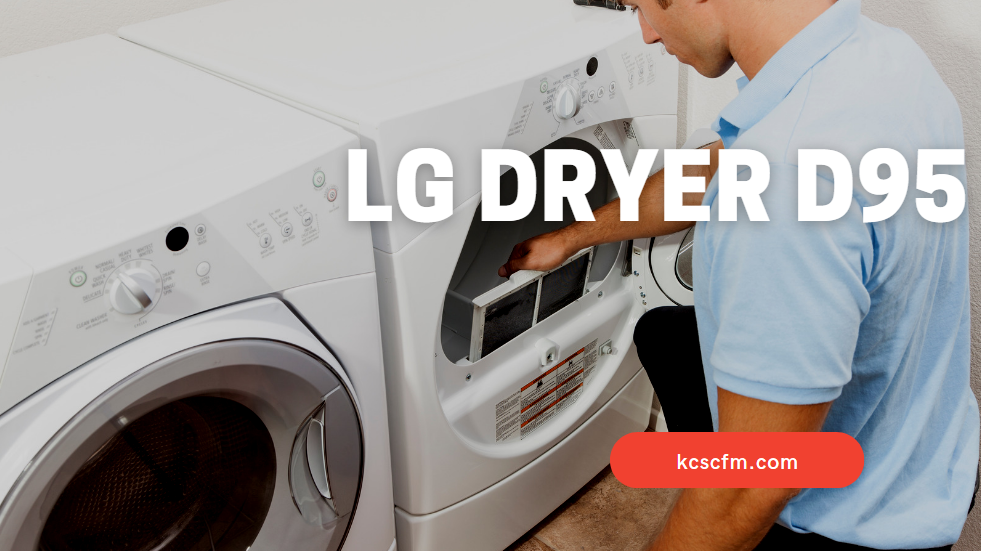Your LG dryer is a stylish appliance that you can use to dry your clothes. In fact, it’s one of the most efficient and reliable machines on the market today. However, if you notice that your LG dryer isn’t working as well as it should be, there’s a good chance you’ll be met with the LG dryer D95 error code.
If your LG dryer is giving you a D95 error code, it means that the air exhaust hose, wall ducts, or vent outside are 95% clogged.
The other causes of D95 error could be a defective heating element or blown thermal fuse.
LG Dryer D95 Error Code – Troubleshoot And Diagnosis

LG uses a few handy features to make your life easier, like a sensor that detects blockages in the exhaust ducts.
When LG dryers detect that there is more than 95% obstruction in the exhaust duct, they will give you a warning — but only after taking into account factors like whether or not the user is drying large items, the room temperature and humidity, air pressure changes, etc.
LG’s Dryers have sensors that help it know exactly what type of laundry customers are working with at all times.
Let’s See the reasons why you are getting D95 error:
1. Clean The Lint Filter
The lint filter in a dryer is designed to capture lint and other small particles that can clog the dryer’s venting system. Lint can build up over time and reduce the efficiency of the dryer, so it’s important to clean the filter regularly.
Clean the lint screen or filter in your clothes dryer at least once a month to prevent a fire. If your dryer has a lint trap on the back, clean that trap once a year.
First, remove the lint screen from the dryer by pulling it out of the housing. Next, use a vacuum with a hose attachment to vacuum out the lint from the screen and the housing. Finally, use a dryer lint brush to remove any lint that is stuck to the screen or housing.
2. Check Exhaust Hose
The exhaust hose in a dryer removes lint and other debris from the dryer during the drying cycle. Lint and debris can build up in the dryer, causing it to overheat and potentially catch fire. The exhaust hose helps to keep the dryer clean and safe.
When the dryer vent is kinked or blocked by lint, little airflow can pass through to the outside environment — which means higher energy costs and increased wear-and-tear on your clothes dryer.
If your dryer’s exhaust hose is clogged, the dryer won’t work properly. To clean the exhaust hose, first unplug the dryer. Then detach the exhaust hose from the dryer and vacuum it out with a vacuum cleaner attachment. Finally, reattach the exhaust hose to the dryer and plug the dryer back in. FYI when LG dryer detect 90% blockage it will give D90 error.
3. Check The Wall Duct
The wall duct in a dryer is responsible for venting hot air and moisture from the dryer to the outside of the home. The wall duct also helps to keep the dryer area clean and free of lint buildup.
A dryer wall duct should be checked regularly for lint buildup, and any blockages should be removed as soon as possible to ensure proper airflow and prevent fire hazards.
Inspect the vent from the back of the dryer to the outside. Clean any lint or debris that you find in the vent.
The dryer wall ducts are located in the attic. To clean them, remove the lint screen from the dryer and vacuum the ducts with the brush attachment of a vacuum cleaner.
Check here for LG dryer np code.
4. Check Outside Vent
The outside vent in a dryer helps to exhaust the hot air and moisture from the dryer to the outside of the home. This helps to prevent the dryer from over heating and damaging your clothing.
Dryer vents are typically located on exterior walls opposite inside wall vents. Most homes are positioned so that the dryer is along an exterior wall, minimizing the distance the outside vent needs to travel.
You may not know where your roof vents are, but don’t worry – some homes do have them. Just take a look around and you’ll be sure to find yours.
Another common dryer vent problem is a buildup of debris that blocks the airflow, leading to overheating and fire. The easiest way to check your vent is simply to look inside it, both at the wall and where it enters your house.
If the lint is dry and hard, try soaking it in water for 5-10 minutes to soften it. If you don’t have warm/hot water access, a blowdryer can help. Do not attempt to use a cleaning chemical — this will set lint on fire and damage your machine.
DIY-ers report success at removing this debris with water — HVAC professionals suggest you purchase a tube of specialized cleaning paste to loosen the build up.
5. Reset The Dryer
Once you’ve unplugged it and and restarted the dryer, give it a minute or two before plugging it back in. If that doesn’t work, contact your appliance repair service for assistance.
6. Check Circuit Breaker
Check to see if the circuit breaker is burned out.
If the circuit breaker is not burned out, check to see if it is tripped. If it is tripped, reset it and see if the dryer works.
If the circuit breaker is not tripped and is not burned out, check the wiring to see if there are any loose connections.
The dryer thermal fuse is located on the back of the dryer. Inspect the fuse for any signs of damage. If the fuse is damaged, replace it with a new one.
7. Load Is Too Small
The load size be too small the dryer sensors cannot detect any moisture in the laundry and therefore cannot activate heating or the tumble function
Be sure to check the drum, venting and vent covers for clogs. The venting path should have a smooth, round shape with no sharp bends.
LG Dryer D95 No Blockage
The dryer lint filter should be checked before each load of laundry. The filter can be located either in the lint trap of your dryer or in the opening of the dryer door.
Remove any lint or debris from the dryer lint filter. A clogged lint filter will cause your dryer to take longer to dry your clothes.
LG dryers come with a feature called Flow Sense. This feature is designed to help the dryer detect when there is a blockage in the venting system. If the Flow Sense feature detects a blockage, it will display an error code on the dryer’s control panel.
Sometimes the Flow sense sensor will not work correctly. We recommend consulting a certified technician to check this issue.

Hi there! I’m Sam Hendricks, and I’m a repair technician and expert. I created this website to help people like you save money and time by fixing your own appliances.
Over the years, I’ve seen people spend a lot of money on unnecessary repairs or replacements. That’s why I decided to share my expertise and create easy-to-follow guides for fixing appliances on your own.
